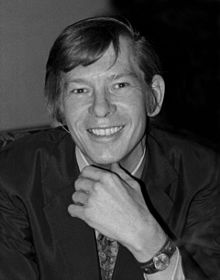Johnnie Ray
| Johnnie Ray | |
|---|---|

Ray in 1969, as best man at Judy Garland's wedding in London, by Allan Warren
|
|
| Background information | |
| Birth name | John Alvin Ray |
| Born |
January 10, 1927 Hopewell, Oregon, United States |
| Died | February 24, 1990 (aged 63) Los Angeles, United States |
| Genres | Traditional pop |
| Occupation(s) | Singer, songwriter |
| Instruments | Vocals, piano |
| Years active | 1951–1989 |
| Labels | Okeh, Columbia |
John Alvin "Johnnie" Ray (January 10, 1927 – February 24, 1990) was an American singer, songwriter, and pianist. Extremely popular for most of the 1950s, Ray has been cited by critics as a major precursor of what would become rock and roll, for his jazz and blues-influenced music and his animated stage personality.Tony Bennett credits Ray as being the true father of rock and roll.
British Hit Singles & Albums noted that Ray was "a sensation in the 1950s, the heart-wrenching vocal delivery of 'Cry' ... influenced many acts including Elvis and was the prime target for teen hysteria in the pre-Presley days."
In 1952, Ray rose very quickly from obscurity to stardom in the United States. He became a major star in the United Kingdom by performing and releasing recordings there in 1953 and shared billing there with many acts including Frank Holder. He matched these achievements in Australia the following year. His career in his native United States began to decline in the late 1950s, and his American record label dropped him in 1960. He never regained a strong following there and very rarely appeared on American television after 1973. His fan base in other countries, however, remained strong until his last year of performing, which was 1989. His recordings never stopped selling outside the United States.
Johnnie Ray was born January 10, 1927, in Hopewell, Oregon, to parents Elmer and Hazel (Simkins) Ray. Along with older sister Elma, Ray spent part of his childhood on a farm in Dallas, Oregon and attended grade school there. The family later moved to Portland, Oregon, where Ray attended high school.
At age 13, Ray became deaf in his left ear following a mishap that occurred during a Boy Scout "blanket toss." In later years, Ray performed wearing a hearing aid. Surgery performed in 1958 left him almost completely deaf in both ears, although hearing aids helped his condition.
...
Wikipedia
